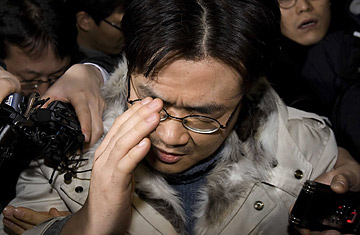
The South Korean blogger who allegedly goes by the name "Minerva" after a court approved his further detention.
South Korea might be one of the most wired places in the world, but it's not necessarily the most Internet friendly. Park Dae Sung, 31, an unemployed blogger now finds himself in hot water for allegedly being "Minerva," a web guru who posted his thoughts on the state of the economy and the government's economic policies. Those thoughts generated huge attention in Korea, particularly following Minerva's prediction that Lehman Brothers would fail. Those musings, however, have not sat well with Seoul. Now Park has been taken into custody by the government and, according to his lawyer, faces a maximum five-year prison sentence for allegedly spreading false information with the intention of harming or threatening public interest. Late last week, Park was denied bail.
Park was arrested on Jan. 10 for a Dec. 29 posting in which he accused bureaucrats of ordering banks to stop buying dollars while the won was falling during last December's global economic crisis. The official news agency Yonhap reported that Park was also arrested for a July 2008 posting that said the Finance Ministry had suspended all foreign currency exchanges. Park's lawyer, Park Chan Jong, says prosecutors are alleging that the posting destabilized the foreign currency market to such an extent that an additional $2.2 billion injection was needed the next day to calm the market. (The prosecution itself has not elaborated on the charges facing Park; and the Ministry of Strategy and Finance says it never made such a declaration to the prosecutors.) (See pictures of South Korea's high-stakes, high-tech gaming culture.)
The Internet buff's lawyer and supporters, including many members of the opposition party, say the purported charge is erroneous because the government, led by the Grand National Party, did indeed ask for dollar buying to be reined in. They further allege that the move reflects a concerted effort by the current conservative government to suppress freedom of speech in cyberspace, especially if it is anti-government in nature. "It's back to the past" says Song Yong Gil, a member of the opposition Democratic Party.
Many South Koreans have the nagging feeling that authoritarian tendencies are in play here since Minerva, who had already achieved notoriety months before the arrest, was in the government's sights as early as September and October after his blogposts predicted the fall of U.S investment bank Lehman Brothers as well as the won's decline. Minerva had become such a sensation during the global financial meltdown that Korea's Minister of Strategy and Finance, Kang Man Soo, weighed in, saying he hoped to furnish the blogger with more economic facts so he would trust the government. (See 10 things to do in Seoul.)
Not all of Park's bearish predictions came true, but many resonated enough that the government reportedly started to fear an insider might be unloading. Foreign exchange players scrutinized Minerva's postings as did government officials trying to guess his identity. At times, Minerva characterized himself as a financial superstar and was so persuasive that Koreans were certain they weren't just following any cybergoon. Minerva also had a growing online audience increasingly skeptical of traditional media and gravitating more and more to the web for scholarship and opinions, especially dissenting viewpoints.
All of this is remarkable if the allegations against Park Dae Sung are correct. According to his lawyer, Park taught himself economics, reading books on the subject since 1997. Indeed, there are some skeptics. The conservative monthly ShinDongA claims that Park may not be the real Minerva at all and that a group of eight other bloggers have professed to writing under the alias. Park's lawyer says the magazine's allegation is "nonsense."
In any case, Minerva "ran circles around the government," says Brendon Carr, a lawyer with the law firm Hwang Mok Park in Seoul. In the past, explains Carr, the government was usually able to assert its views by strenuously voicing its opinions to newspapers and broadcasters by way of phone calls. But officials didn't know how to reach whomever was behind Minerva except by public announcements — which got the government nowhere. The resulting arrest of Park, Carr contends, is a classic case of bureaucrats with old habits struggling to adjust to the new Korea. "Korea is supposed to be a democratic success story and this case does not feel democratic," says Carr.
While South Korean officials are quick to boast about the country's Internet prowess, they are also increasingly on edge about the downside of online banter, specifically online rumor mongering, which they fear is getting out of hand on the peninsula and only last year drove a South Korean celebrity to commit suicide. The Internet also helped to draw tens of thousands of citizens onto the streets of Seoul during last summer's anti-U.S. beef and Free Trade Agreement protests.
As Park's case awaits trial, law experts in Korea see this case as an opportunity to clean the books of laws that restrict freedom of speech, statutes they claim are aimed at rooting out the opposition. Says Park Kyungsin, a professor of law at Korea University, "There's definitely elements of authoritarianism in the nooks and crannies of our legal system."
See pictures of South Korea's oil spill.
See pictures of the New York Philharmonic Orchestra performing in North Korea.
